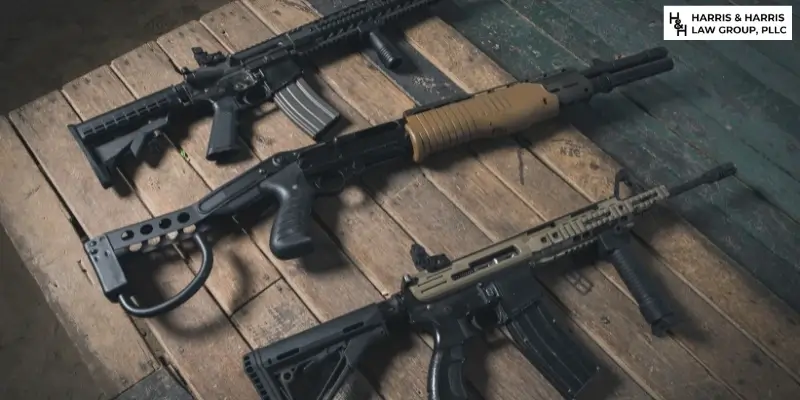|
|
Last Modified on Jul 15, 2025
Gun rights and regulations continue to be a hot topic across the country. That is extremely evident in the Lone Star State. Texas gun laws are known for being expansive and constantly evolving to reflect society’s needs. Whether you are a lifelong gun owner or are looking to purchase your first firearm, it’s important to stay updated on the rules you to follow to stay out of trouble.
Why Gun Charges Are Taken So Seriously in Texas
Texas may have some of the most permissive gun laws in the country, but that doesn’t mean firearm-related offenses are treated lightly. Both prosecutors and law enforcement view these charges through a serious lens, as the implications on public safety are significant. Even a simple misunderstanding with a weapon could escalate into criminal charges with steep penalties.
Here are why these cases often receive heightened attention:
- The high recovery rate of firearms: In one single year, the ATF traced more than 40,000 firearms back to Texas. This signals just how frequently guns are suspected of being used in criminal cases.
- Gun deaths remain high: Texas had a firearm injury death rate of 3 per 100,000 people. It’s a growing concern among prosecutors about the consequences of gun misuse.
- Homicides and firearm use are closely linked: Firearms were used in 76 % of all murders in Texas in one year. This demonstrates a tight link between gun crimes and violent offenses.
All of this to say, even if you believe your case is minor, it might not be treated that way in court. It’s crucial to work with a defense team that understands how these cases are prosecuted and how to fight back as effectively as possible.
Understanding Texas Gun Laws in 2025
Knowing what is and isn’t allowed under Texas gun laws is the first step to protecting your rights and avoiding unnecessary legal trouble.
Here are a few key principles every gun owner in Texas should understand:
- Carrying with a permit is allowed for most adults 21 and older, but there are still location-specific restrictions. This is most seen in areas like schools, bars, and government buildings.
- Convicted felons are generally prohibited from possessing firearms, even if they are kept tucked away at home.
- Transporting a firearm in your vehicle is allowed under most circumstances, but there are rules around how and where it must be stored if you don’t have a valid license.
- Using a gun in self-defense is protected under Texas law in some circumstances, but prosecutors can still bring charges forward if they believe your actions were not justified.
- If you buy, sell, or modify a firearm, it could trigger federal scrutiny. This is especially true if the gun is found to have been involved in a crime down the road.
- Minors are generally not allowed to legally possess or carry a firearm unless they are under the supervision of a guardian. Violations of this can lead to criminal charges for both the minor and the adult responsible.
It’s important to understand these laws to help you avoid mistakes. And if you have been accused of a gun-related crime, having a strong grasp of what these laws require can help you challenge any allegations you believe are unfair or are not rooted in fact.
FAQs
Q: Can I Carry My Gun in My Pocket in Texas?
A: In most circumstances, you are allowed to carry a gun in your pocket in Texas. However, there are some factors to keep in mind. First, the weapon must be properly holstered. Where you carry this weapon also matters. Some locations, like schools and government buildings, are off-limits. Just because you are allowed to carry a gun doesn’t mean you are allowed to bring it wherever you want or in any manner.
Q: Can I Carry a Gun in Texas as a Non-Resident?
A: Non-residents are able to carry firearms in Texas but need to follow many of the same rules that apply to those who live here. For instance, you still need to meet the age and legal eligibility requirements. Also, if you were prohibited from owning a firearm in your state of residence, that doesn’t mean you can come into Texas and have an automatic clean record. Those restrictions still apply in Texas.
Q: What Should I Do If I’m Arrested for a Gun-Related Charge?
A: If you have been arrested for a gun-related charge in Texas, the most important thing to do is to keep silent and invoke your right to request legal counsel. Trying to explain yourself can backfire, as you may inadvertently incriminate yourself. Those words can be used against you later in court. When you bring on a defense lawyer, they start evaluating the facts of your case and building a defense to challenge any vulnerabilities they spot in the opposing counsel.
Q: What Happens If I Use My Gun in Self-Defense?
A: There are scenarios in which using a firearm in self-defense is permitted, but not every time. Even if it seems like a justified move, law enforcement may still investigate the shooting to make a quick call if you need to be arrested. Even if you genuinely were defending yourself, prosecutors may still try to pursue charges. At this point, it’s up to you and your defense lawyer to make it clear your behavior was proportional to the threat you faced.
Gun Defense Attorney in Texas
At the Harris & Harris Law Group, PLLC, we know that being accused of a gun-related offense in Texas can turn your life upside down. It’s why our team takes a hands-on approach to ensure your future is not being treated with a one-size-fits-all defense. As a family-founded firm, we built our law firm on hard work, trust, and honest communication. When you work with us, you always know where your case stands and the latest information on Texas gun laws.
If you have recently been accused of gun crime in Texas, contact our firm today. We are happy to take an assessment of what happened and give our recommendation on what we believe would be your strongest next steps to defend yourself and protect your rights.




